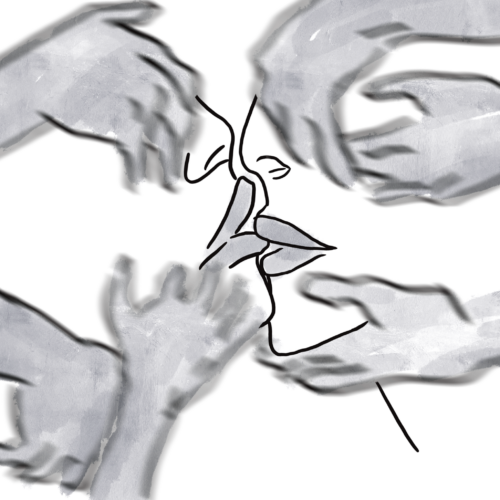As I sit cross-legged on my common room sofa, it’s hard not to notice the vibrant Valentine’s Day decorations adorning each corner of the room—strings of heart-shaped “Be Mine” notes and pink tissue paper are draped across the walls. But as I settle into the room, the ambiance is interrupted by the abrasive comments of Fox News reports discussing the “dangerous” rise of “undocumented immigrants” and the “threat” of transgender youth in schools. My mind is torn between the cheerful decor and the harsh political rhetoric coming from the TV.
A few minutes later, a recent Instagram post from the official White House account caught my attention. The post, featuring a photo of President Trump and Tom Homan’s faces against a backdrop of Valentine’s Day decor, masked a trashy political jab under the guise of humor: “Roses are red, Violets are blue, come here illegally and we’ll deport you.” The post ended with the phrase “Happy Valentine’s Day.” The sheer absurdity of pairing a holiday about love with such an openly hostile message left me stunned. The post was a reminder that, in today’s climate, even something as pure as Valentine’s Day can’t escape the gravitational pull of politics. The contrast between a day meant to celebrate love and a message designed to divide underscored just how deeply entangled love and politics have become.
In recent years, sweeping political changes have upended lives and reshaped the nation’s social fabric, leaving many uncertain about their rights and futures. The latest surge in mass deportations has sent shockwaves across the nation. At the same time, activist groups have raised alarms about the exclusion of transgender individuals from government programs, and legal scholars have been challenging the wave of federal worker layoffs. These political developments not only threaten basic rights but also make it harder for many to express love openly, without fear.
The arrival of a holiday traditionally centered on love is especially poignant at a time when many groups fear they are losing the freedom to express love openly. Over the years, expressions of love have taken many forms—from an undocumented couple rising early to perform backbreaking labor to finance their children’s education, to the joyful tears of someone completing their gender transition journey, to the quiet resolve of students fighting for racial equity on campuses across the country.
What strikes me most during this time is the incredible courage displayed by these groups. I think of the coffee shop barista who recently shared his Valentine’s Day plans with me—how he and his husband were going to celebrate his recent transition with a special dinner in Boston followed by ice skating. They made this choice despite the overwhelming noise surrounding the new administration’s recent attacks on transgender individuals.
I think of undocumented individuals who are, right now, picking out flowers in anticipation of February 14 for their loved ones, daring to love fully in the present, even as they know their physical connection may be at risk the following day. My heart is touched by the thought of recently laid-off federal workers, still choosing to celebrate their loved ones with a meal, despite having watched the career they built their lives around evaporate in just a matter of days. I also think of the transgender individuals who, despite the heightened discrimination they face, are still finding moments to celebrate love and authenticity, persevering through challenges that threaten their existence.
This dynamic is not a novel one. Demonstrations of affection amid times of uncertainty have characterized human history for a long time. Love during periods of persecution has served as a means of survival. As Martin Luther King Jr. eloquently said, “Love is the greatest force in the universe. It is the heartbeat of the moral cosmos. He who loves is a participant in the being of God.” The historical examples that testify to this truth are innumerable. From activists singing songs of love in the quiet of church basements during the Civil Rights movement to individuals crafting protest signs during South Africa’s anti-apartheid struggle, the capacity for love to transcend suffering has been a powerful force for change across the world.
Nowadays, it can be challenging to fight political rhetoric that seeks to undermine the humanity of countless groups. Yet, it is precisely through love—love that is deeper, bolder, and more defiant—that we can begin to confront this hate.
While many fear that the coming years will be fraught with heightened anxiety, I believe that they should be defined by concrete acts of resistance and resilience, fueled by love. Love is not just an abstract emotion—it is the force that drives us to confront injustice, speak out against hate, and build coalitions that challenge divisiveness. When the mountain ahead seems insurmountable, the most powerful thing we can do is take collective, deliberate steps toward change, supporting each other through every act of solidarity and moment of care.
This Valentine’s Day, to love in the face of uncertainty is one of the most radical and liberating acts we can embrace. The audacity of love is an undeniable force, one that defies the odds and overcomes fear. So, tell that person you love them, even when the world doesn’t reflect that same kindness. Buy those flowers, even when tomorrow feels uncertain. Laugh as loudly and freely as you can, even when the weight of the world presses down. It is only through love that we will uncover a light at the end of the tunnel.
In 2025, celebrating a holiday built on love has become an act of resistance. As long as hardship persists, so too must our ability to see beyond the fears it brings, choosing instead to celebrate our shared humanity.
Nashla Turcios ’28 (nashlaturcios@college.harvard.edu) writes Forum for the Harvard Independent.

